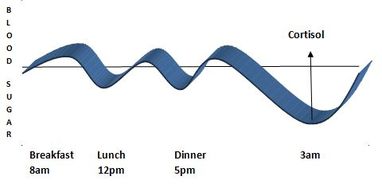 Guest post by Dr. Justin Gallant, ND. See original post here. I have had many patients recently come in with sleep maintenance insomnia, and Dr. Gallant explains very nicely why this may happen. Almost 80% of the patients who walk through my door wake up around 1-3am. The most common reason for this is hypoglycemia. Once I get them eating a small snack with protein before bed their sleep-maintenance insomnia usually subsides. There are several other reasons for waking up around this time but clinically I have seen low blood sugar as being the most common. If having a snack before bed doesn’t cut it and you’re still waking up in the middle of the night you should definitely talk to your Naturopath or Medical Doctor about it, especially if you're having other symptoms. Many people say eating before bed will cause you to gain weight but a small snack may actually help you lose weight as I discuss further down. Protein helps glucose get into your cells more efficiently via insulin and is converted to glucose much slower than if you were to just eat sugar. Fiber slows your absorption rate of glucose so both protein and fiber will help keep your blood sugar stay stabilized while you’re sleeping. Protein also provides amino acids that are necessary for neurotransmitters like serotonin, dopamine and GABA (which I mention below) to be made. Every action has a reaction so if you eat that donut your blood sugar will sky-rocket and then plummet soon after. Your goal should be to keep your blood sugar as close to the midline in the picture above as you can and aim to have blood sugar regulated until cortisol is naturally elevated when it's time to wake up. Snack ideas: A piece of bread with peanut butter Hard-boiled egg Legumes like chick peas, beans, nuts, seeds Soup or stew Protein shake or protein bar Veggies, crackers or pita dipped in hummus. Stay away from simple carbs and sugary snacks like fruit before bed as they’ll just temporarily elevate your blood sugar and it will come crashing down soon after, increasing the likelihood of hypoglycemia while you’re sleeping. Explanation of why you wake up: During the night your liver is working hard at metabolizing glucose and your brain is actively organizing your thoughts and dreaming. If you eat dinner at 5 or 6pm and then try to go until 8 or 9am without any food you’re going to get hypoglycemic just like you would if you tried to go 14 hours without food during the day. Once our sugar gets too low we pump out cortisol from our adrenal glands. Cortisol is one of our stress hormones. We pump it out naturally to increase our blood sugar but since it’s a stress hormone it wakes us up. Cortisol also inhibits GABA, which is an inhibitory neurotransmitter which helps keep us calm and relaxes our muscles. So now you’re stressed and can’t relax…thanks a lot brain, I thought you were smart? Once our blood sugar gets too low we must secrete cortisol for survival. Our brains use ~30% of the glucose we take in and even though we’re sleeping, each cell in our body needs glucose for fuel. Eating a snack before bed will actually help you lose weight! Bold statement right? Well think about it. If you’re going 10-14 hours without food your body is going to go into famine-mode. It thinks once it gets breakfast that you could go another 12 hours without food so it’s going to store whatever you put into it as fat to be used for energy later. This is the equivalent of your Uncle Bob carrying a bunch of Jerry cans full of gas in his ol’ pick up so he doesn’t have to keep going to the gas station when he’s running on fumes. There are plenty of other reasons why we wake up in the middle of the night which can be exacerbated by hypoglycemia as well. For instance, if you have Benign Prostatic Hyperplasia (BPH), you may be waking up around 3am because you have to pee. Most men attribute this to the BPH but once I get these guys eating properly and having a snack before bed the urge to urinate doesn’t wake them up anymore. It’s more of a combo of something is going on in your body that would wake a light sleeper but if you can get into the deep sleep, you won’t be so sensitive to it. This effect can happen with almost any symptom that’s preventing you from sleeping (i.e. bloating, pain, flatulence, snoring, etc…). Our bodies are programmed to turn our senses off while we’re sleeping, but if we pump out cortisol we’re going to wake up and those senses will re-engage. Once our senses re-engage we will be able to perceive those internal and external stimuli that we wouldn't have noticed while in a deep sleep. Besides feeling terrible, insomnia comes with its complications as well which are too plentiful to discuss in this article but can involve weakening your immune system, emotional strife, poor work performance, side effects from caffeine and poor-decision making to name a few. Other causes of sleep-maintenance insomnia: Sleep apnea A restless partner Restless Leg Syndrome (RLS) - I'll be blogging about this soon! Congestive Heart Failure Sleep paralysis, hypnopomp, astral catalepsy, whatever you want to call it. Anxiety Hyperthyroidism Nutrient deficiency (Iron most commonly) GERD Respiratory conditions like COPD, Lung cancer, etc… Night sweats High or low blood pressure Segmented sleep, bimodal sleep pattern, biphasic or polyphasic sleep BPH Urinary issues Pelvic floor weakness Diabetes Medication side effect According to Traditional Chinese Medicine, waking up between 1-3am could indicate your liver needs attention. This could be due to anger issues, dietary, excess alcohol, etc… Sometimes just doing acupuncture, taking Chinese herbs or dealing with diet or anger can completely resolve sleep-maintenance insomnia. Thanks for reading! Please read the disclaimer in the footer of my website (www.drjustingallantnd.com). If you have any questions, comments or contributions feel free to comment below. If you would like to book an appointment with me please call 905-547-5393 or contact me. Sincerely, Dr Justin Gallant ND Hamilton, Ontario
0 Comments
Your comment will be posted after it is approved.
Leave a Reply. |
AuthorDr. Tamar Ferreira is a Naturopathic Doctor in Brampton, Ontario. Her areas of focus include digestive health, hormone balance, and skin conditions. Topics
All
Archives
May 2020
|
118 Queen St. W., Suite 205
Brampton, ON
L6X 1A5
905-451-3963



 RSS Feed
RSS Feed